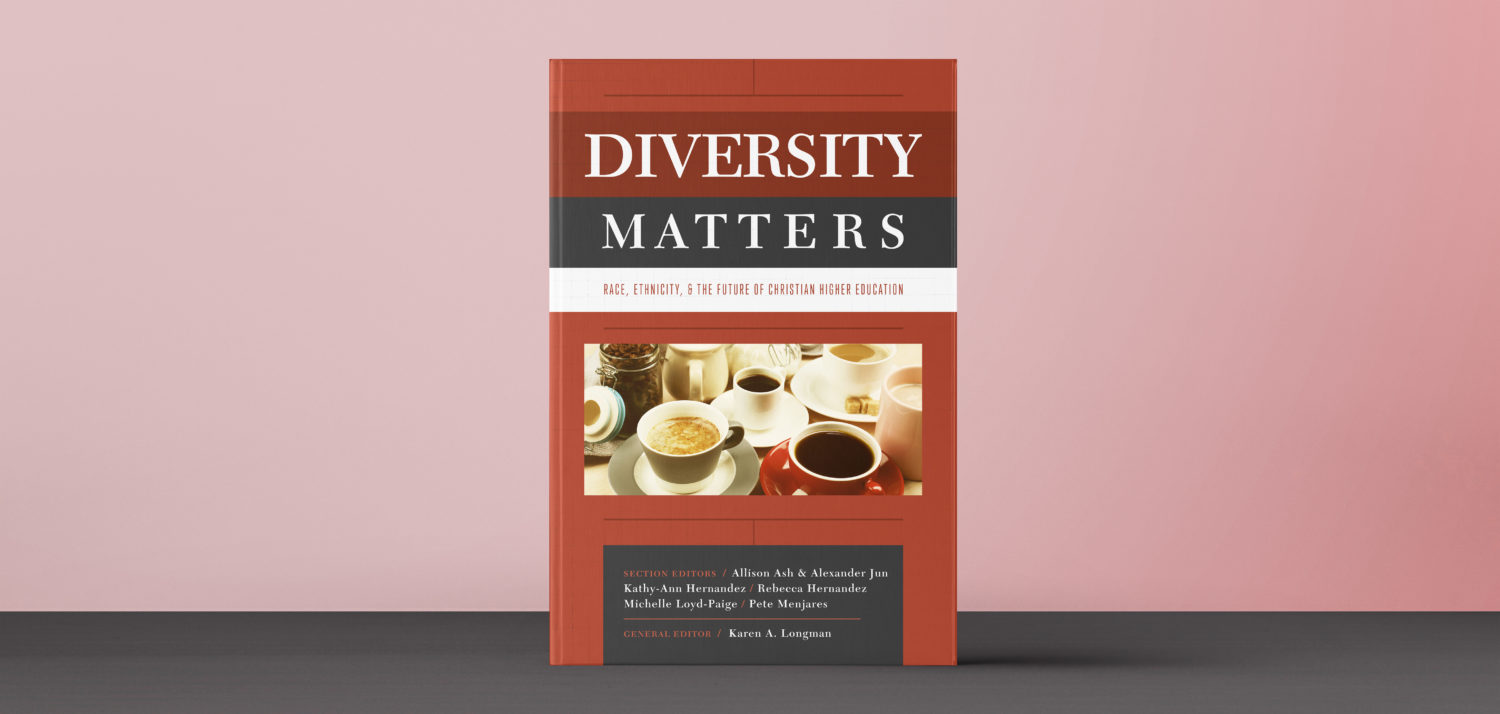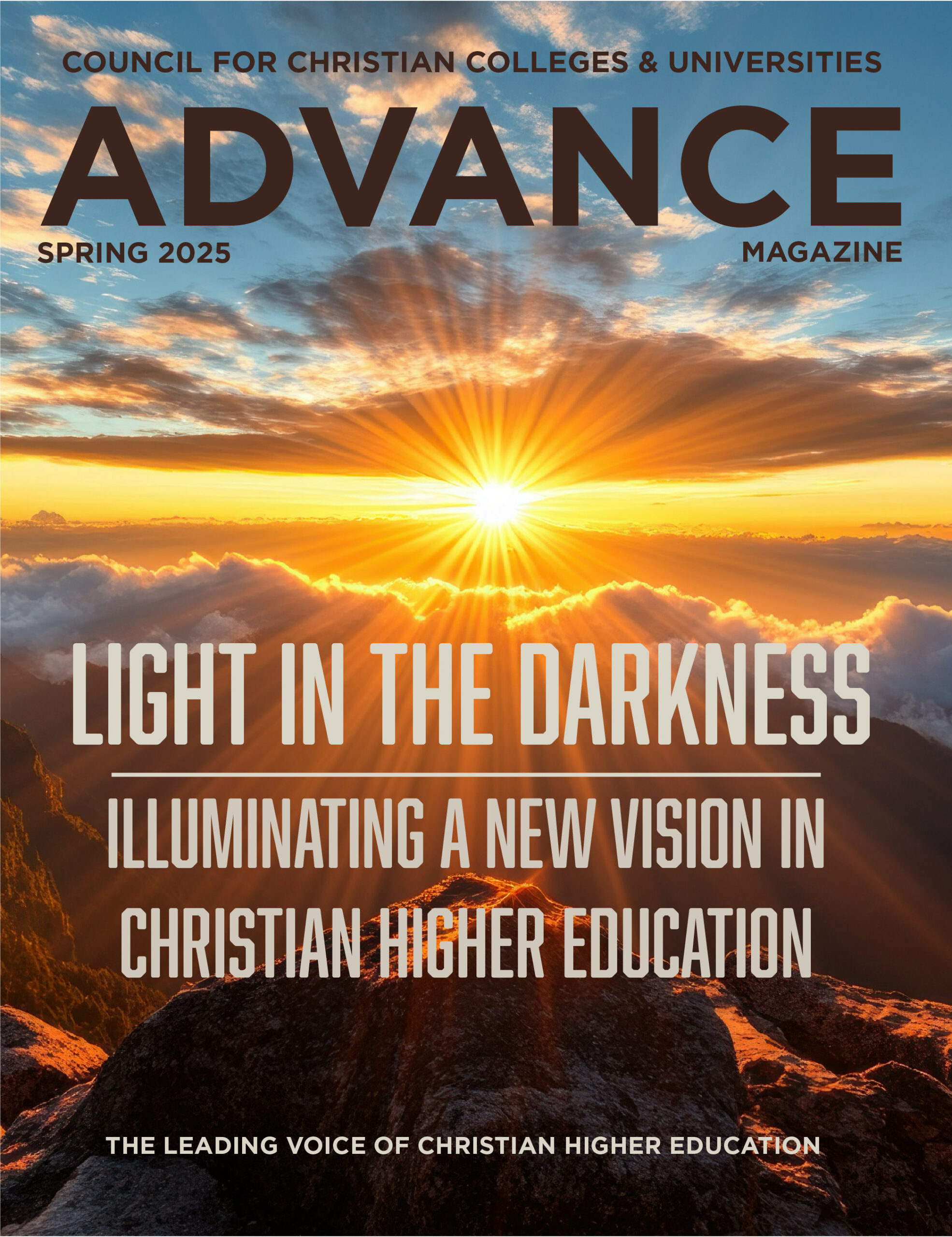Magazine

In August, Abilene Christian University Press published the new book Diversity Matters: Race, Ethnicity, and the Future of Christian Higher Education. With essays from nearly 30 leaders and scholars who work on CCCU campuses across the country divided into five key sections, Diversity Matters offers leaders a roadmap as they think through how their campuses can serve all students well.
We asked the editors of each section of the book a few questions, both to highlight the breadth of the book’s contents and to offer a glimpse at some of the key points raised in each section.
Section One | Campus Case Studies: Transforming Institutions with a Commitment to Diversity
Pete Menjares
Your section focuses on the “big-picture” within the CCCU – are there any changes that are particularly noteworthy?
The single greatest change in the CCCU over the last decade is the increase in students from diverse backgrounds. The increase in student diversity is remarkable: the majority of CCCU campuses today have double-digit diversity; a growing number of campuses have enrollments where “minorities” outnumber “majority” students; and at least five CCCU institutions have achieved Hispanic Serving Institution status.
But we still remain challenged by how to create truly inclusive institutions. Faculty, staff, and administrator diversity has not kept pace with student diversity. The curriculum does not always include diverse perspectives, and spiritual life and chapel programs do not always address the soul needs of a diverse student body. However, I am hopeful for the future because I see a growing number of people of all colors with the expertise, passion, and commitment for building diverse and inclusive institutions.
What are one or two key lessons you hope leaders in the CCCU take away from this part of the book?
A first key lesson: Know your institutional history. I was amazed and inspired by the early history of the four institutions highlighted in the book. These institutions were established on key biblical values that formed the basis of their education and the practice of faith. Their early histories also revealed that a core commitment to diversity and inclusion is in their DNA. How many other CCCU institutions have similar stories but may not be aware of them? Institutions with a commitment to kingdom diversity may find inspiration in their own histories.
A second key lesson is institutional faithfulness to God. At each turn in the story of these institutions, their leaders kept the focus on the centrality of Jesus Christ, the importance of faith, and being a part of the greater work of the kingdom of God. They demonstrated courage, conviction, and a willingness to exercise a prophetic voice to keep their campuses true to their core commitments at times when they were tempted to stray.
What do you hope this book will accomplish?
I hope it will serve as an invitation to dialogue throughout the institution. The book was authored by long-serving faculty, staff, and administrators in the CCCU who share the same commitment to a life transforming, Christ-centered education. The authors are members of the “CCCU family,” and it is my hope that space is created on all campuses for open, honest, and safe dialogue about diversity and inclusion matters that lead to meaningful and lasting institutional change.
Pete Menjares is the senior director of the Institute for Faculty Development at Vanguard University (Costa Mesa, CA) and the CCCU Senior Fellow for Diversity.
Section Two | Why We Stayed: Lessons in Resiliency and Leadership
Michelle Loyd-Paige
Your section highlights some of the CCCU leaders who have been dedicated for a long time to diversity work. What are some lessons these leaders say helped them persevere?
Two things come to mind. The first: a personal relationship with Jesus and a life of faith. A life of faith aids in building resiliency (God is our comforter, provider, burden bearer, sustainer, way maker – you get the picture). A life of faith also shapes the understanding of the work as a calling by God to the places we serve (“Not my will, Lord, but yours”).
The second: a good support system, often made up of family and friends outside of the academy. Support systems provide moral and psychological support. This kind of support is key when an individual is a “solo” person of color – as in, the only (or one of a very few) person of color on a campus.
What advice do the practitioners who contributed essays to this section have to offer to those who feel alone in this work?
It is hard to speak for all the contributors in this section, but I believe each would agree that, “Take care of yourself; put your own oxygen mask on first,” is good advice. So often, those who feel alone in this work have moments when they feel like they have nothing left to give, and yet they feel compelled to extend themselves even more to “help” the college or “to prove they belong.” This work can be mentally and emotionally exhausting, even when the campus is not in crisis. Taking care of oneself is key, and so is finding allies on campus, connecting with colleagues on other campuses who do this work, finding a mentor, and learning to ask for help.
What do you hope this book will accomplish?
I hope this book will help Christian campuses understand that a truly diverse, inclusive campus doesn’t just happen because they are Christian. It takes work, and it takes more than good intentions. No matter our best efforts, there will be mistakes, misunderstanding, and resistance – but we have to keep moving forward because diversity matters. I hope this book will help people see that Christian higher education is uniquely positioned to make an impact in this arena.
Michelle Loyd-Paige is executive associate to the president for diversity and inclusion and a professor of sociology at Calvin College (Grand Rapids, MI).
Section Three | Voices of Our Friends: Speaking for Themselves
Allison Ash & Alexander Jun
In the section you co-edited, you focus on the role white leaders can and should play in supporting this work. What are one or two key points you would highlight for CCCU leaders?
Ash: We hope leaders will understand the importance of people in the white community becoming involved in efforts to end inequality and racism in Christian higher education. The overwhelming majority leading these efforts have been people of color. This section helps people to understand that as the white community engages in this kind of work, it is critical to do the sometimes difficult work of self-reflection about power and privilege and how those realities have contributed to the inequities that continue to exist today. We are hopeful that this section will motivate and mobilize the white community to self-reflect on their own racial identities and engage more deeply in the process of seeking justice and reconciliation in Christian higher education.
Jun: I would add a reminder to CCCU leaders – it’s not about you. Please do not take this personally. This is not about individual sins only, but about addressing a larger systemic and structural racism that goes unchecked in Christian colleges across the country. That said, we also underscore the importance of individual responsibility and action toward anti-racism.
What do you hope this book will accomplish?
Ash: Through gaining a clear picture of the current state of racial diversity at Christian higher education institutions, reading stories of leaders who are seeking change at their institutions, reading stories from faithful leaders of color who have persevered through tumultuous times, and being challenged to also make a difference in their institutions, we hope that those who read this book will be empowered to make lasting change on their campuses.
Jun: The next generation of students, faculty, and campus leaders will not look like the current generation. Is Christian higher education ready for that change? Our hope is that readers will prepare for that great multitude that no one could number, from all tribes and peoples and languages, standing before the throne and before the Lamb, by studying and fellowshipping next to one another on Christian campuses across the country.
Allison Ash is dean of student care and graduate student life at Wheaton College (Wheaton, IL). Alexander Jun is a professor of higher education at Azusa Pacific University (Azusa, CA).
Section Four | Curricular/Cocurricular Initiatives to Enhance Diversity Awareness and Action
Rebecca Hernandez
Your section focuses on some of the practical ways Christian colleges and universities can enhance diversity awareness and action. What should leaders keep in mind?
One of the most important things to consider when you start this work is to confirm your leadership is with you – that they understand and are committed to the diversity work you are doing. That shows in several ways. First, being present. They talk up, support, and attend diversity events. It is important for leaders to model so that others follow. Second, programs are funded and staffed to appropriate levels in the general budget, not grant or “special” (meaning one-time) funding. The goal is to make diversity initiatives part of the institution so that they are normalized.
What advice do the practitioners who contributed to this section offer to those who feel alone in this work?
Keep pressing on. Throughout the essays, contributors reiterate signs of hope and persistence: “Continue the work.” “The journey is still unfolding.” “I continue to encounter allies along the way.” Matthew 7:24-27 says it all: “Build on solid rock.” As believers, we know that everything we do in the good name of the Lord is built on a solid foundation, so we encourage those getting tired to stand on the solid Rock of faith.
What do you hope this book will accomplish?
Our hope with this book is that faculty, staff, administrators, and others in the Christian higher education community will get a better understanding of the varied facets of diversity work. There are ways to operationalize this work, and there is a role for all of us in it. It’s not just the “diversity person’s” role but, frankly, from the executive leadership, to the dorm leaders, to the faculty in the classroom, to the front desk person – it is all of our responsibility to care, advocate, and build up each other.
Rebecca Hernandez is associate provost, local and global engagement, and chief diversity officer at George Fox University (Newberg, OR).
Section Five | Autoethnographies: Emerging Leaders and Career Stages
Kathy-Ann Hernandez
Your section focuses on emerging leaders. Are there any insights or trends that have helped these contributors recognize their potential?
There are two things that strike me as particularly poignant. First is the salience of intersecting identities in the work of diversity and inclusion. For all the authors in this section (myself included), our greatest challenges to leadership aspirations occurred at the intersection of multiple identities – whether it was being black and male, black and female, or immigrant, black, and male. These intersections coalesced into a complex web of challenges that threatened to block our path to leadership.
Second is the great need we expressed collectively for opportunities for leadership development. For all of us, attending the CCCU’s Multi-Ethnic Leadership Development Institute was pivotal in providing us with resources, strategies, a supportive community, and the beginnings of professional development networks. The latter is particularly useful for people of color in predominantly white spaces, as we are often positioned outside these networks in our own contexts, making us the last to get noticed, mentored, and positioned for leadership.
What can senior leaders on our campuses do to promote the development of leadership capacity that we’re seeing in the next generation?
Everybody loses when talented employees are not well-positioned to give their best service to the institution. Senior leadership needs to be intentional in crafting policies and strategies to seek out these individuals, matching them with mentors and sponsors, and allocating funding for leadership development training and support. Additionally, since people of color are already so few in number on most campuses, I also suggest that avenues be explored for cross-university mentor/sponsor matching, as well as the creation of support groups to create community and useful professional development networks for minorities.
What do you hope this book will accomplish?
I have become more convinced that this is “heart work” before it is “head work.” We must engage in difficult conversations that will challenge not just our thinking but our heart as well. I hope that this book will be a spark for igniting such conversations. Engaging in the work of diversity and inclusion requires courage: courage to ask hard questions, courage to seek honest answers, and courage to change. The authors in this book have been courageous enough to start the conversation. I hope readers will be courageous enough to join in the discussion.
Kathy-Ann Hernandez is a professor of educational psychology and research methods at Eastern University (St. Davids, PA) and director of research at Eastern’s Loeb School of Education.



